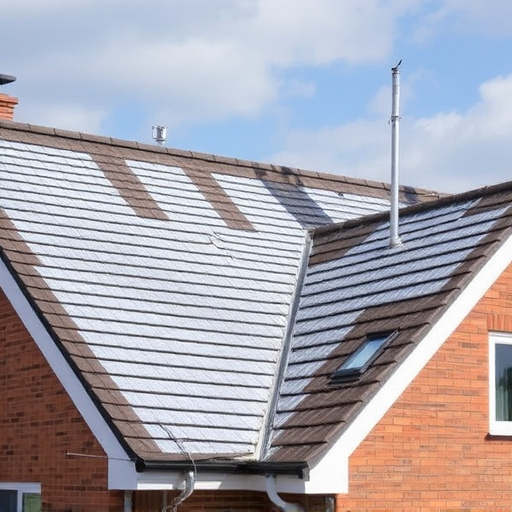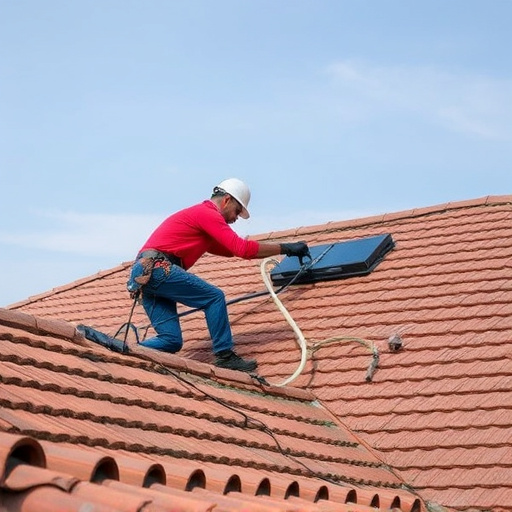Selecting the Right Roof Contractor for Historic Home Restoration
When restoring historic homes, choosing the right roof contractor is key. Prioritize professionals e…….
In the vast landscape of construction and building maintenance, roof contractors stand as essential pillars, responsible for the intricate art of safeguarding structures from the elements. This article aims to take readers on an in-depth journey through the world of roof contracting, exploring its various facets, global impact, economic significance, technological innovations, regulatory frameworks, and the challenges it faces. By delving into these aspects, we will uncover the critical role roof contractors play in shaping our built environment and their importance in ensuring the durability and safety of our homes and businesses.
A roof contractor is an expert in the design, installation, repair, and maintenance of roofs. This specialized profession involves a deep understanding of various roofing materials, structural integrity, weather patterns, and local building codes. Roof contractors can be categorized into several types, including residential, commercial, industrial, and specialty contractors, each catering to specific needs within the broader industry.
Historically, roof contracting has evolved from traditional methods where skilled artisans passed down their knowledge through generations. With the advent of modern technology and increased complexity in building designs, the role has expanded to incorporate advanced techniques, safety protocols, and a wider array of materials. Today, roof contractors are integral to every stage of a building’s lifecycle, from initial construction to routine maintenance.
The influence of roof contractors is not limited to geographical boundaries; it is a global phenomenon with distinct regional variations. In North America, for instance, the industry is characterized by high standards and stringent regulations, ensuring excellent craftsmanship and safety. Countries like Canada and the United States have well-established associations and training programs for roof contractors, fostering a culture of professionalism.
Asia, particularly countries like China and Japan, has witnessed rapid urbanization leading to an increased demand for efficient and durable roofing solutions. This trend has driven innovation in materials, such as lightweight steel roofing and advanced insulation technologies. In Europe, the focus on energy efficiency and sustainable building practices has led to a rise in green roof contracting, incorporating eco-friendly materials and designs.
Global trends also include the adoption of smart technologies, such as weather forecasting systems integrated with roofing software, to optimize maintenance schedules and predict potential issues. Additionally, the remote monitoring of roofs using drones and satellite imagery is gaining traction, enabling early detection of leaks and damage.
The roof contractor industry is a significant contributor to global economies, with various market dynamics at play. According to a 2022 report by Grand View Research, the global roofing market size was valued at USD 174.3 billion in 2021 and is projected to grow at a compound annual growth rate (CAGR) of 6.5% from 2022 to 2030. This growth can be attributed to factors like rising construction activities, increasing urbanization, and growing awareness about energy-efficient roofing solutions.
In terms of investment patterns, private equity firms and venture capitalists have shown a keen interest in roof contracting businesses, recognizing their potential for steady returns and long-term growth. Many companies are investing in technology upgrades, research and development of new materials, and expansion into niche markets to stay competitive.
Technology has played a pivotal role in transforming roof contracting from a manual, labor-intensive process to a highly efficient and precise profession. Here are some significant advancements:
The roof contractor industry is subject to various policies and regulations that vary across jurisdictions. These frameworks are designed to ensure safety, quality, and ethical practices in the roofing sector. Some key considerations include:
Despite its growth and technological advancements, the roof contractor industry faces several challenges and criticisms. Addressing these issues is crucial for maintaining high standards and public trust:
Toronto, known for its vibrant urban landscape, embarked on a mission to create more sustainable and environmentally friendly buildings. A local roof contractor, EcoRoof Solutions, stepped up to the challenge by specializing in green roofing systems. They offer a range of services, from designing and installing vegetative roofs to providing maintenance and repair.
Success Factors:
Lessons Learned:
Japan, renowned for its traditional roofing crafts, has embraced digital transformation to enhance efficiency and precision. One prominent contractor, TechRoof Inc., has pioneered the use of advanced technologies, including drone inspections and digital design software.
Digital Initiatives:
Impact:
The roof contractor industry is poised for continued growth and innovation in the years to come. Here are some potential areas of focus:
Roof contractors are not just construction professionals; they are guardians of our buildings, ensuring shelter and safety for millions of people worldwide. From historical craftsmanship to modern technological innovations, this industry has evolved to meet the demands of a changing world. As we look ahead, the future of roof contracting promises exciting possibilities, with a focus on sustainability, digital transformation, and advanced materials.
By embracing challenges, staying informed about regulations, and continuously innovating, roof contractors will continue to play a vital role in shaping our urban landscapes and ensuring the longevity of our structures. This article has provided a comprehensive overview, but the journey of exploration is endless, with each project presenting unique opportunities for growth and learning.
Q: How do I choose a reputable roof contractor?
A: Look for contractors with proper licensing, insurance, and positive customer reviews. Ask for references, check their work history, and ensure they use high-quality materials. Reputable contractors will also provide detailed estimates and maintain open communication throughout the project.
Q: What are the common signs that my roof needs repair?
A: Keep an eye out for missing or damaged shingles, leaks, mold or mildew growth, visible damage from storms or extreme weather, and increased energy bills due to poor insulation. Regular inspections can help identify these issues early.
Q: How often should I get my roof inspected?
A: It is recommended to have a professional roof inspection every 2-3 years, or more frequently if you live in an area prone to severe weather conditions. Regular inspections can help catch potential problems before they become major repairs.
Q: Are green roofs worth the investment?
A: Green roofs offer numerous benefits, including improved energy efficiency, extended roof lifespan, and positive environmental impacts. While initial costs may be higher, long-term savings on energy bills and reduced maintenance make them a worthwhile investment for many property owners.
Q: What is the typical timeline for a roofing project?
A: Project timelines can vary depending on the scope of work, weather conditions, and contractor availability. Small repairs might take a few days, while complex new constructions or major renovations could span several weeks or even months.

When restoring historic homes, choosing the right roof contractor is key. Prioritize professionals e…….

Roof contractors are vital for navigating complex building permit processes, ensuring compliance wit…….